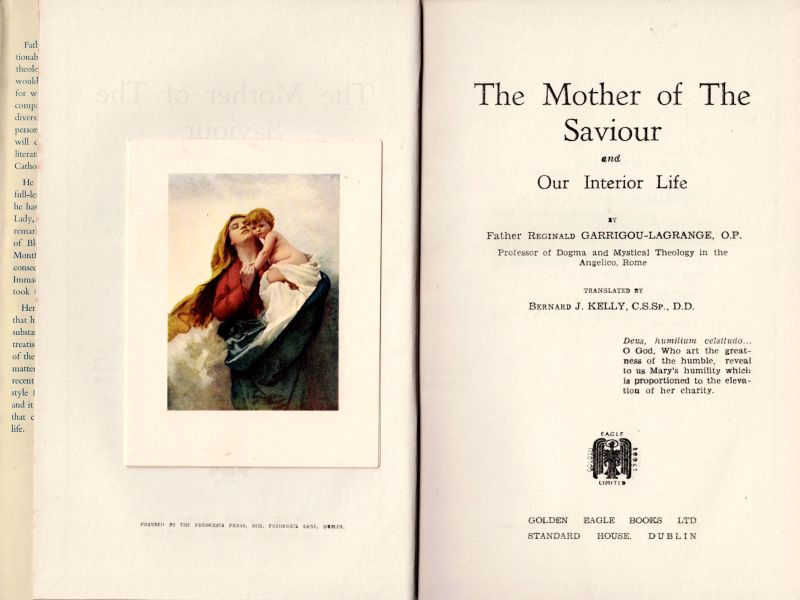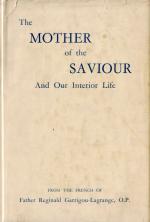Garrigou-Lagrange, The Mother of The Saviour and Our Interior Life.
The Mother of The Saviour and Our Interior Life. By Father Réginald Garrigou-Lagrange, O.P., Professor of Dogma and Mystical Theology in the Angelico, Rome. Translated by Bernard J. Kelly, C.S.Sp., D.D.
The very Rare First English Language Edition. Dublin, Golden Eagle Books Ltd., 1948. Octavo (15 cm wide x 22 cm high). 338 pages. Original Hardcover with original dustjacket in protective collector’s mylar. Very good condition with only minor signs of wear. Extremely rare publication !
Réginald Marie Garrigou-Lagrange OP (21 February 1877 – 15 February 1964) was a French Dominican friar, philosopher and theologian. Garrigou-Lagrange was a neo-Thomist theologian, recognized along with Édouard Hugon and Martin Grabmann as distinguished theologians of the 20th century. As professor at the Pontifical University of Saint Thomas Aquinas, he taught dogmatic and spiritual theology in Rome from 1909 to 1959. There he wrote The Three Ages of the Interior Life (Les trois âges de la vie intérieure) in 1938.
While studying medicine at Bordeaux, he experienced what he described as a religious conversion after reading Life, Science, and Art by the Breton writer Ernest Hello (1828–85). He would later recall to his Dominican confrere, Rosaire Gagnebet:
I was able to glimpse how the doctrine of the Catholic Church is the absolute Truth concerning God and his intimate life and concerning the human person, his origin and his supernatural destiny. I saw in a wink of an eye that it was not a truth relative to our time and place but an absolute truth that will not change but will become more and more apparent up to the time when we see God face to face. A ray of light shone before my eyes and made clear the words of the Lord: “The heavens and the earth will pass away, but my words will not pass away.” I understood that this truth must bear fruit like the grain of wheat in good soil…″
He is best known for his spiritual theology. His magnum opus in the field is The Three Ages of the Interior Life (Les trois ages de la vie intérieure), in which he propounded the thesis that infused contemplation and the resulting mystical life are in the normal way of holiness of Christian perfection. This influenced the section entitled “Chapter V: The Universal Call to Holiness in the Church” in the Second Vatican Council’s Dogmatic Constitution on the Church, Lumen gentium.
He synthesized the highly abstract writings of St. Thomas Aquinas with the experiential writings of St. John of the Cross, attempting to show they are in perfect harmony with each other.
Father Garrigou-Lagrange, the leading proponent of “strict observance Thomism”, attracted wider attention when in 1946 he wrote against the Nouvelle théologie theological movement, criticizing elements of it as Modernist.
He is also said to be the drafter of Pope Pius XII’s 1950 encyclical Humani generis, subtitled “Concerning Some False Opinions Threatening to Undermine the Foundations of Catholic Doctrine”.
In politics, like many neo-scholastic theologians of his time, Garrigou-Lagrange was a strong supporter of the far-right movement Action Française and he also sympathized with Vichy France. In 1941 he praised the French collaborationist regime and its Chief of State Pétain in a letter written to his former disciple Jacques Maritain: “I am entirely with the Marshal, I see him as the Father of the patrie, blessed with a good sense verging on genius, and as a truly providential man”. Maritain described Garrigou-Lagrange as “valiantly fighting for Vichy,” while Maritain’s anti-Vichy student Yves Simon wrote of Garrigou-Lagrange, “If I did not hold the sacerdotal role in such respect I would write to him that I would hold him responsible if some misfortune comes to any of my Jewish friends”. Indeed, Garrigou-Lagrange went so far as to declare in a letter that for a Catholic to support de Gaulle would be a mortal sin. However, as Matthew K. Minerd, Ph.D., states in an interview, Garrigou-Lagrange’s support for the Vichy regime reflected a Catholic reaction against the French Revolution and the Republic, especially its anti-clericalism. Furthermore, in Garrigou-Lagrange’s remarks on Pétain, Dr. Minerd has not found a single antisemitic statement. Garrigou-Lagrange also admitted a lack of engagement with political questions and acknowledged that politics was his weakest area. (Wikipedia)
- Keywords: Catalogue No.7 – Religion · Madonna · Mother of Jesus Christ · Religion · Religion – Rare
- Language: English
- Inventory Number: 32218AB
EUR 275,--
© 2026 Inanna Rare Books Ltd. | Powered by HESCOM-Software











